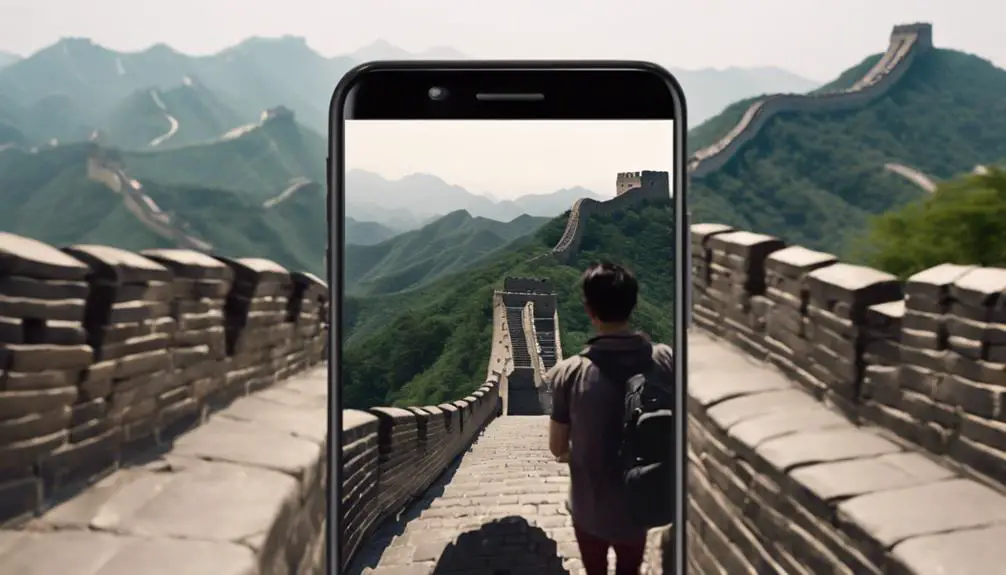In China, using Google Voice comes with challenges due to government restrictions. Calls are limited, prompting users to explore alternatives like GrooVe IP. Solid Wi-Fi is crucial for international calls, and understanding dialing procedures and data needs is key. The Great Firewall's impact on internet access affects Google Voice usage. Unlock more insights on coping mechanisms, language fluency needs, and effective communication strategies.
Internet Censorship in China
Internet users in China face significant restrictions due to the country's advanced internet censorship system, known as the Great Firewall. This powerful system blocks access to numerous popular websites and services, including Google, Facebook, and Twitter.
Consequently, individuals in China encounter challenges when attempting to utilize services like Google Voice for communication purposes. The Great Firewall operates through government regulations and the monitoring of online activities, limiting the freedom of internet users in the country.
To circumvent these restrictions, many turn to VPNs (Virtual Private Networks) to access censored content and bypass the controls imposed by the Chinese authorities. The impact of internet censorship in China extends beyond mere content restrictions, influencing the way individuals communicate and interact online.
Understanding the intricacies of the Great Firewall is essential for maneuvering the digital landscape in China and adapting to the limitations imposed on internet usage.
Restrictions on Google Voice
Accessing Google Voice in China presents users with significant challenges due to government-imposed restrictions and internet censorship. Google Voice calls are restricted in China, making it difficult for users to utilize the service seamlessly. Issues may arise when attempting to dial access numbers or make calls through Google Voice.
To overcome these restrictions, some users resort to using third-party apps like GrooVe IP as an alternative solution. When using Google Voice for international calls in China, having a stable Wi-Fi connection becomes essential to guarantee cost-effective usage.
Understanding the technical details of Google Voice functionality in China, such as the dialing processes for access numbers and data connection requirements, is essential for users dealing with these restrictions. By being aware of these limitations and exploring workarounds, users can still leverage Google Voice's features while in China despite the imposed restrictions.
Communication Challenges
Facing communication challenges while using Google Voice in China can be a common occurrence due to government restrictions and internet censorship.
Google Voice calls may not always work seamlessly in China, leading to difficulties in accessing the service on certain devices.
To overcome these obstacles, users often resort to using alternative apps like GrooveIP for VoIP calls through Google Voice. In some cases, manual dialing workarounds or third-party apps become essential for maintaining Google Voice functionality in the country.
Additionally, considerations around data usage and Wi-Fi connectivity are vital factors to keep in mind when using Google Voice in China.
These challenges highlight the complexities of handling communication services in a region where internet restrictions play a significant role in shaping the digital landscape.
As a user in China, understanding these hurdles can help you proactively address potential issues and find suitable solutions to guarantee smooth communication via Google Voice.
Navigating Government Restrictions
Understanding the government restrictions in China requires a keen awareness of the regulatory landscape surrounding Google Voice services. Due to internet censorship laws, Google Voice faces limitations in China, leading to challenges for users accessing its services.
Certain features of Google Voice may be restricted or entirely unavailable in the country. To navigate these restrictions, many users resort to using Virtual Private Networks (VPNs) or third-party applications to bypass the censorship and access Google Voice functionalities.
It's essential for individuals in China to comprehend the constraints imposed by the government to utilize Google Voice effectively. By acknowledging and adapting to these limitations, users can enhance their experience with Google Voice within the confines of the regulatory framework.
Despite the obstacles, users in China continue to find ways to leverage Google Voice, showcasing resilience and adaptability in the face of governmental restrictions.
Language Fluency Requirements
Understanding the regulatory landscape surrounding Google Voice services in China entails not only grasping government restrictions but also necessitates fluency in Mandarin or Cantonese for effective communication with local users. Proficiency in these languages is essential for engaging with mainland Chinese users, addressing their concerns, and providing technical support related to Google Voice.
Language skills play a significant role in guiding conversations about Google Voice, as they enable clear and accurate communication regarding limitations and workarounds specific to the Chinese market. Additionally, fluency in Mandarin or Cantonese helps in building trust and rapport with users seeking assistance with Google Voice services in China.
Tips for Effective Communication
To enhance communication efficiency while managing the restrictions on Google Voice in China, consider implementing these practical tips. When utilizing alternative apps like GrooVe IP for VoIP calling, ensuring a stable Wi-Fi or data connection is essential. Understanding the technical limitations of Google Voice in China can help you navigate communication challenges more effectively. Additionally, being familiar with internet censorship in China is important for utilizing Google Voice or similar services successfully.
Consider the following table for quick reference on tips for effective communication in China:
| Tips for Effective Communication |
|---|
| Be sure to maintain a stable internet connection |
| Be aware of technical restrictions |
| Familiarize yourself with internet censorship |
| Use alternative apps like GrooVe IP |
| Stay updated on communication regulations |
Conclusion
To sum up, maneuvering Google Voice in China is like trying to swim upstream against a strong current. The restrictions imposed by the government create communication challenges for users, requiring them to find creative ways to bypass censorship and maintain language fluency.
Despite the obstacles, with perseverance and strategic planning, effective communication can still be achieved in this complex digital landscape.

